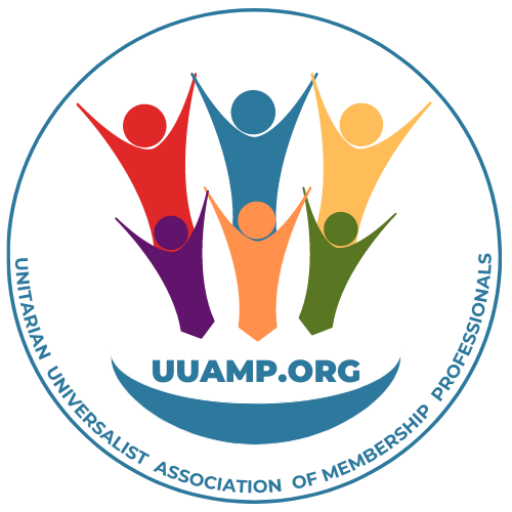Past:
Soon after UUAMP was formed in 2011, the group began creating a Certification Program to serve as an important component of UUAMP’s professional development opportunities.
A steering committee researched the certification programs of other UU professional organizations and decided to focus on making the UUAMP program Applicable, Attainable, and Accessible. To that end, they developed a framework of 10 competency areas, with four “core” areas in which all membership professionals should be proficient, and six “choice” areas, where professionals could select two areas that best fit the portfolio of their specific position. The committee worked with a consultant to assemble materials, ran two series of pilot programs for all of the competencies, and incorporated the feedback into revisions.
The core competencies are:
- Fostering a Culture of Welcome
- Building a Community of Belonging
- UU History and Identity
- Boundaries
And the choice competencies are:
- Administration & Volunteer Management
- Engagement
- Integration and Leadership
- Pastoral Care
- Communications and Social Media
- Stewardship
For more details on the UUAMP Certification Program, click here: https://uuamp.org/continuing-education-resources/uuamp-certification-program/
Present:
Since the Program’s creation there have been a few updates to the certification materials, but it is now time for significant maintenance to repair broken links, as well as a thorough review of the readings, webinars, and other materials to ensure they reflect current UU priorities and expressions of values. For instance, a fresh look by a consultant with experience assessing materials through an anti-racist, anti oppressive, multicultural (ARAOM) lens could be beneficial.
In light of the significant input of time, talent and treasure needed for these updates, UUAMP board members decided that the future of the Certification Program is a conversation that must include a wide array of UUAMP members. All members were invited to participate in a Zoom discussion on February 17th, and those who couldn’t attend were invited to share feedback by email.
Judging from the response to the invitation, it appears there is a great amount of enthusiasm from members are who are already engaged or are just learning about the Certification Program and who want it to continue to be available.
Future:
One suggestion that came out of the February 17th meeting was to explore the potential for restructuring the UUAMP Certification Program so that it can be purchased and completed in smaller parts. Those who complete the 4 core competencies and 2 of the 6 choice competencies can be certified, and those who don’t can still get the educational benefits of the parts with which they do engage.
It was noted that such a model would be similar to the LREDA Renaissance Module program, where a person could just take one or a few modules, or if they decide to get credentialed, any modules completed can go towards getting the certificate.
Another meeting participant expressed an interest in exploring various ways of demonstrating competency, particularly for people who have been working in the field for many years and who might have the ability to draw on some of their existing portfolio for aspects of their certification.
It was also observed that as people are more easily gathering remotely now, compared to when the Certification Program began, there is potential for more participant collaboration opportunities and mentorship connections than in the past.
And finally, it was recognized that for this conversation to continue, a task force must form. The people in that task force would identify and prioritize specific steps to update the Certification Program, and would identify people (perhaps a mix of UUAMP member volunteers and professional consultants) to implement the needed changes.
Some questions the task force will also need to consider are:
- Whether there is a need to pause the current program during the review and update process,
- How to continue supporting the people already engaging in the current program materials,
- How to keep the richness of the existing program without losing momentum to get it updated
The parameters of the task force’s work can be defined by the task force itself, though at a minimum there is a need to find ways to fix links in the existing program and swap more current materials for any that are out of date. Beyond that, task force members can center their unique gifts to explore and delineate the extent of the UUAMP Certification Program’s potential changes so that it can become even more applicable, attainable and accessible.
If you would like to be on the task force to chart the future of the UUAMP Certification Program, email Kristin Cleveland at clc@uuschenectady.org.
